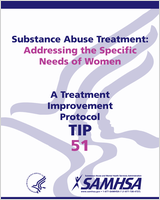This is an open-access report distributed under the terms of the Creative Commons Public Domain License. You can copy, modify, distribute and perform the work, even for commercial purposes, all without asking permission.
NCBI Bookshelf. A service of the National Library of Medicine, National Institutes of Health.
Contents
- What Is a TIP?
- Consensus Panel
- Editorial Board
- KAP Expert Panel and Federal Government Participants
- Foreword
- Executive Summary
- 1 Creating the Context
- 2 Patterns of Use: From Initiation to Treatment
- 3 Physiological Effects of Alcohol, Drugs, and Tobacco on Women
- Overview
- Physiological Effects and Consequences of Substance Abuse in Women
- Physiological Effects: Factors of Influence
- Physiological Effects of Alcohol
- Physiological Effects of Licit and Illicit Drugs
- Physiological Effects of Tobacco Use
- Effects of Alcohol, Drugs, and Tobacco Use on Pregnancy and Birth Outcomes
- Effects of Alcohol and Illicit Drugs on HIV/AIDS Status
- 4 Screening and Assessment
- 5 Treatment Engagement, Placement, and Planning
- 6 Substance Abuse Among Specific Population Groups and Settings
- 7 Substance Abuse Treatment for Women
- 8 Recovery Management and Administrative Considerations
- Appendix A: Bibliography
- Appendix B: CSAT's Comprehensive Substance Abuse Treatment Model for Women and Their Children
- Appendix C: Screening and Assessment Instruments
- Appendix D: Allen Barriers to Treatment Instrument
- Appendix E: DSM-IV-TR Criteria for Posttraumatic Stress Disorder
- Appendix F: Integration Self-Assessment for Providers
- Appendix G: Resource Panel Members
- Appendix H: Cultural Competency and Diversity Network Participants
- Appendix I: Field Reviewers
- Appendix J: Acknowledgments
- CSAT TIPs and Publications Based on TIPs
This publication was prepared under contract numbers 270-99-7072 and 270-04-7049 by the Knowledge Application Program (KAP), a Joint Venture of The CDM Group, Inc., and JBS International, Inc., for the Substance Abuse and Mental Health Services Administration (SAMHSA), U.S. Department of Health and Human Services (HHS). Andrea Kopstein, Ph.D., M.P.H., Karl D. White, Ed.D., and Christina Currier served as the Contracting Officer's Representatives.
Suggested citation:
Substance Abuse and Mental Health Services Administration. Substance Abuse Treatment: Addressing the Specific Needs of Women. Treatment Improvement Protocol (TIP) Series, No. 51. HHS Publication No. (SMA) 13-4426. Rockville, MD: Substance Abuse and Mental Health Services Administration, 2009.
The views, opinions, and content of this publication are those of the author and do not necessarily reflect the views, opinions, or policies of SAMHSA or HHS.
- NLM CatalogRelated NLM Catalog Entries
- Substance Abuse Treatment: Addressing the Specific Needs of WomenSubstance Abuse Treatment: Addressing the Specific Needs of Women
Your browsing activity is empty.
Activity recording is turned off.
See more...
